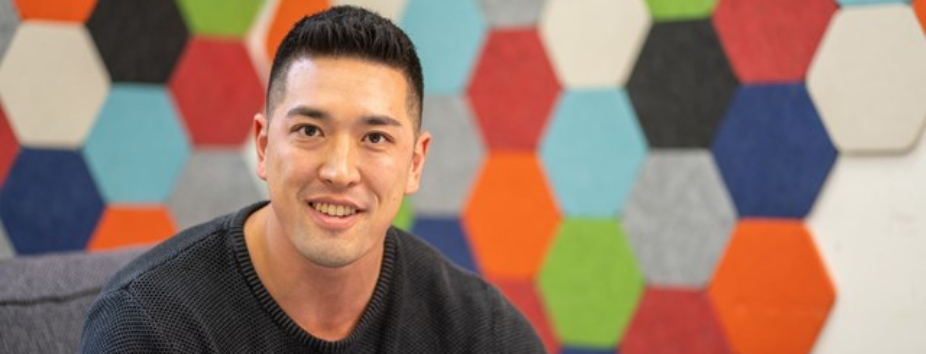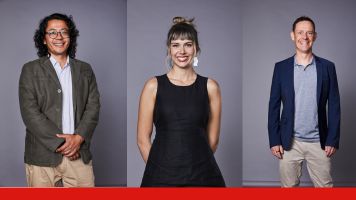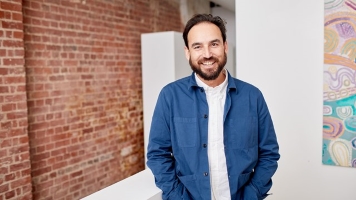
Written by Leanne Tomkins
2022 Westpac Social Change Fellow Joe Kwon has returned from a month of travel with renewed vigour for influencing the reform of the Australian prison system. In his mission to help reduce recidivism in Australia, Joe recently visited prisons in Norway and the USA, and met with justice reform academics and fitness-related organisations for at-risk youth in England.
Joe is the Founder and CEO of Convict Fitness (ConFit), a social enterprise employing former inmates as fitness trainers, which he started after serving time in prison for directing a criminal enterprise. Joe also founded ConFit Pathways, a non-profit that employs former adult inmates to mentor and run fitness programs for young people inside youth justice centres.
“We use fitness to engage with young people, and because of our own lived experience we connect straight away,” says Joe. “We run a fitness program first to help them let their guard down. Then, when they're listening, we talk about issues like self-worth, gratitude and the value of employment education.”
ConFit Pathways also partners with other service providers, such as UNSW, to support inmates leaving prison to re-enter the community.
Norway
Joe’s international travels began with a visit to Bergen Prison, Norway to run fitness training with inmates of one of the world’s most progressive prison systems.
“Their whole prison system focuses on humanising inmates and making everyday activities normal,” he says. “They have a shopping mall inside a maximum-security prison. The inmates get credit cards, and male and female inmates get to mingle in the shopping centre while they do their groceries. It’s a system completely based on trust.”
In minimum security, Joe was encouraged to take inmates on a run through the mountains outside the prison, where he put them through a HIIT-style (High-Intensity Interval Training) session.
“They didn’t even have ankle bracelets on. We were running through the mountains and I was just looking out over this view thinking how beautiful it was,” he says.
“I had a hypothesis, before I travelled, that prison is a reflection of its society,” he says. “The problems here are the same – disadvantage, childhood trauma, substance abuse – but people in Norway are pragmatic. They pay some of the highest taxes in the world and they want to know where their taxpayer dollars are going.
“The Norwegians have worked out that if they help inmates by educating and rehabilitating them, instead of punishing them, then people don’t go back inside once released and the country doesn't have to pay for it,” he says.
Joe also met other organisations such as Way Back, which was founded by people with lived prison experience and provides community support for inmates coming out of custody.
“It was inspiring to see an organisation so similar to us come such a long way over 15 years of operation, and to learn about the different programs that they run which are having such good outcomes.”
London
From Norway, Joe travelled to London to meet with organisations such as the Alliance of Sport that work with young, formerly incarcerated inmates and young people coming out of custody.
“I wanted to see organisations that are using sport to engage young people and to divert them into employment education,” says Joe. “I was looking at how they structured their model – it’s good to get some insight because they're very successful in what they do, partnering up with football clubs and using sports stars to engage with troubled youth.”
Joe also spent time in Oxford meeting with academics on the forefront of justice reform.
“All the latest research was about digitalisation of prisons,” he says. “We know that bricks-and-mortar prisons don’t work and we know that punishment doesn't work. So there’s a lot of research on how home detention – just being taken away from society – is punishment enough on its own, and we shouldn’t be breaking up families or affecting a person’s ability to provide for their family.”
New York
To further understand how different prison systems operate, Joe travelled to New York where he ran fitness programs for inmates at Rikers Island jail and Bergen prison. Upon arrival he immediately noticed the significant overrepresentation of African American inmates.
“A lot of the prisons in the USA are becoming privatised, and the inmates were telling me how crazy the lack of care is, as the prisons try to minimise costs,” he says.
“In the USA, the prisoner numbers are abnormally high. They hold the highest prison population in the world with more than 2 million inmates, which is 25% of the world prison population. Prisons are overcrowded and in very poor condition and the privatisation model looks to hold more inmates while reducing prison staff numbers.”
“When I was at Rikers, inmates were able to go outside once a week and they were confined in small units where I had trouble running large group training sessions due to the lack of space. I was also left to run programs on my own in the units with no staff supervision,” he says. “And Australia is starting to move in that direction right now. There are three privatised prisons in New South Wales and they plan to open more.
“I want to make sure this doesn’t happen. We should be working with communities to ensure less people arrive in prison, because long term that's what's going to work.”
Changing the system
Joe began formulating a bigger vision for his capacity to affect social change after attending the Westpac Social Change Fellow Leadership Program in Adelaide.
“One of the areas we focused on in the Leadership Program was systems change and systems thinking,” he says. “I thought my workmates and I were just a bunch of former inmates doing fitness and using it as a vehicle to resonate with others in prison, but we weren't really thinking about the bigger picture. I never would have expected we could have such big input into changing the justice system in Australia.”
Now, Joe has now been invited by the Department of Youth Justice in Australia to share his experiences and suggest improvements to the prison system. He attributes being a Westpac Scholar for giving him the credibility to have that conversation.
Published 11 November 2022
Are you a social change leader looking to accelerate your growth and impact?
Apply for a Westpac Social Change Fellowship and you could receive up to $50,000 to invest in your personal development and join network of passionate changemakers working to create a more inclusive and sustainable future for all Australians.


